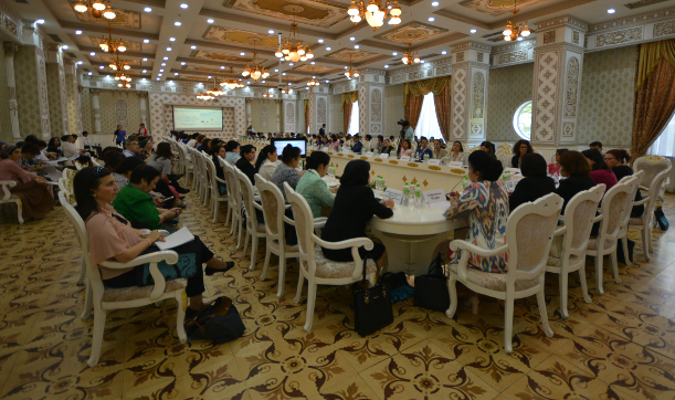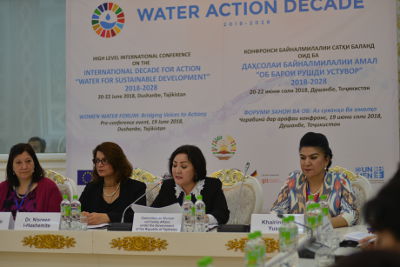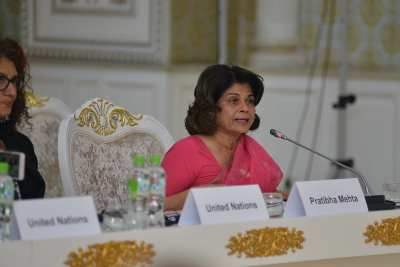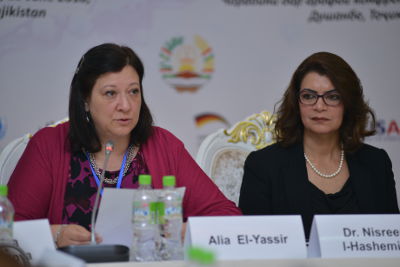Press Release: The Government of Tajikistan and international community spotlight women as key enablers in ensuring access to clean water and sanitation
At today's high-level international meeting "Women Water Forum: Bridging Voices to Actions” preceding the ‘International Conference on the International Decade for Action “Water for Sustainable Development”', the Government of Tajikistan, together with the international community, including UN Women, the European Union, HRH Princess Dr. Nisreen El-Hashemite as well as representatives of the Brazilian and Australian Government, called for urgent action to ensure women’s and girls’ right to access clean water and sanitation and to participate in processes related to their effective management.Date:

(Dushanbe, 19 June 2018) – Close to 150 people from 20 countries in the world gathered in Dushanbe today to discuss and identify ways to ensure equal access to clean water and sanitation for all, including the most disadvantaged communities, and include more women in decision-making positions and as leaders in water resources management. Participants agreed that women should be key agents of change and enablers in processes related to the provision, management and safeguarding of water.
The event “Women Water Forum: Bridging Voices to Actions” took place at the onset of the High Level International Conference on the International Decade for Action “Water for Sustainable Development” 2018-2028, which will continue through 20 to 22 June in Dushanbe. The high-level conference will gather a large group of stakeholders from across the globe to discuss new approaches to effective water resources management, encourage enhanced cooperation, inclusive engagement and partnership to support internationally agreed goals and targets related to water resources, including the Sustainable Development Goal (SDG) 6 on clean water and sanitation.

“The Women Water Forum 2018 is taking place at an important time. Now we have the opportunity to take significant steps to move from words to actions. We can unite the voices of women to achieve sustainable and efficient use of water. We should all join efforts to ensure safe and clean water and sanitation for all,” said Olimi Marhabo, the Deputy Head of the Committee on Women and Family Affairs of the Government of Tajikistan.
The Women Water Forum concentrated on the three thematic areas in conjunction with the high-level panels of the Dushanbe Water Conference:
- National and international commitments to the International Water Decade and women engagement;
- Actions for capacity building, linking knowledge, science and technologies in support of women’s leadership and participation;
- Building partnerships for achieving SDG 6, with a specific focus on investing in women for water management.
Safe drinking water and sanitation are essential for the full enjoyment of life and all human rights. They are particularly important for women and girls, who are most often the primary users, providers and managers of water in their households. However, in many countries around the world, diminishing water resources has a disproportionate impact on women and girls. Globally, in 80 per cent of households with water shortages, women and girls are responsible for water collection. This often means travelling long distances and carrying heavy loads, stealing away the time women could spend on earning an income and girls on attending school.

Pratibha Mehta, UN Resident Coordinator and UNDP Resident Representative to Tajikistan, stressed: “Gender equality and access to water and sanitation are intrinsically linked. Globally women and girls are primary water collectors for their family and on an average spend nearly three hours per day for this purpose, this not only limits their time for education or to participate in work force but also carrying heavy water containers affect them physically including pelvic deformities causing problems during child birth. It is crucial to involve women in financing and planning for water and sanitation as well as in finding innovative solutions to reduce daily drudgery and promoting gender specific service delivery.”
Participants of the meeting agreed that necessary measures need to be taken to facilitate easy access to safe drinking water for all. They recommended:
- To emphasize and promote women as key agent of change in ensuring implementation of the 2030 Agenda for Sustainable Development, including SDG 6;
- To leave no one behind and provide access to water for the most disadvantaged communities;
- To call for strong multi-stakeholder engagement and partnerships as a key precondition for the successful implementation of the 2030 Agenda for Sustainable Development;
- To invest in women as key enablers and agents of change for the achievement of the 2030 Agenda for Sustainable Development.

Alia El-Yassir, Regional Director a.i. for UN Women in Europe and Central Asia, said: “We need to recognize that women are stakeholders in water management equal to men. Women’s agency, knowledge, and decision-making are critical for securing access to clean, safe and affordable water and sanitation for all and for ensuring sustainable development. Women’s skills, knowledge and contributions need to be considered and adequately valued in the effective management of water. The opportune momentum created by the Water Action Decade provides us with the chance to prioritize water and sanitation as intrinsic to sustainable development and women are key change agents in all processes related to access and effective management.”
Participants also emphasized the critical role of science, technology and innovation for women’s empowerment and in addressing global water challenges.
HRH Princess Dr. Nisreen El-Hashemite, Founder and President of Women in Science International League and the Executive Director of the Royal Academy of Science International Trust (RASIT), stressed the urgent need to promote new thinking at International Community on the mechanisms that support innovation in Sustainable Development programs and Action Plans: “The challenges facing the world’s countries – its prosperity and economy, creativity, exchange, equity, and opportunity – will be met if we deploy Science technology and innovation knowledge, skills and methods of inquiry ever more intensively. Enabling us to discuss the many existing problems, issues facing societies today, and then to determine the indispensable solutions, actions, policies and programs to overcome these problems and issues, it is essential and necessary to focus on the role of Women in Science in global strategies and achieving sustainable development for 2030 and beyond.”
“Political commitment and concrete measures are needed to achieve women’s effective participation in water management. This is not an objective in itself, but rather should be done to increase the resilience of the sector and make it more sustainable,” stressed Malina Kroumova, Deputy Minister of Regional Development and Public Works of Bulgaria.
Recommendations from the meeting were shared at the High-level Conference plenary session on 20 June 2018.
Outcome document of the Women Water Forum is here.
Media Contacts:
Gulnaz Imamniyazova, UN Women
Mobile: +992 93 93 404 94
E-mail: gulnaz.imamniyazova@unwomen.org